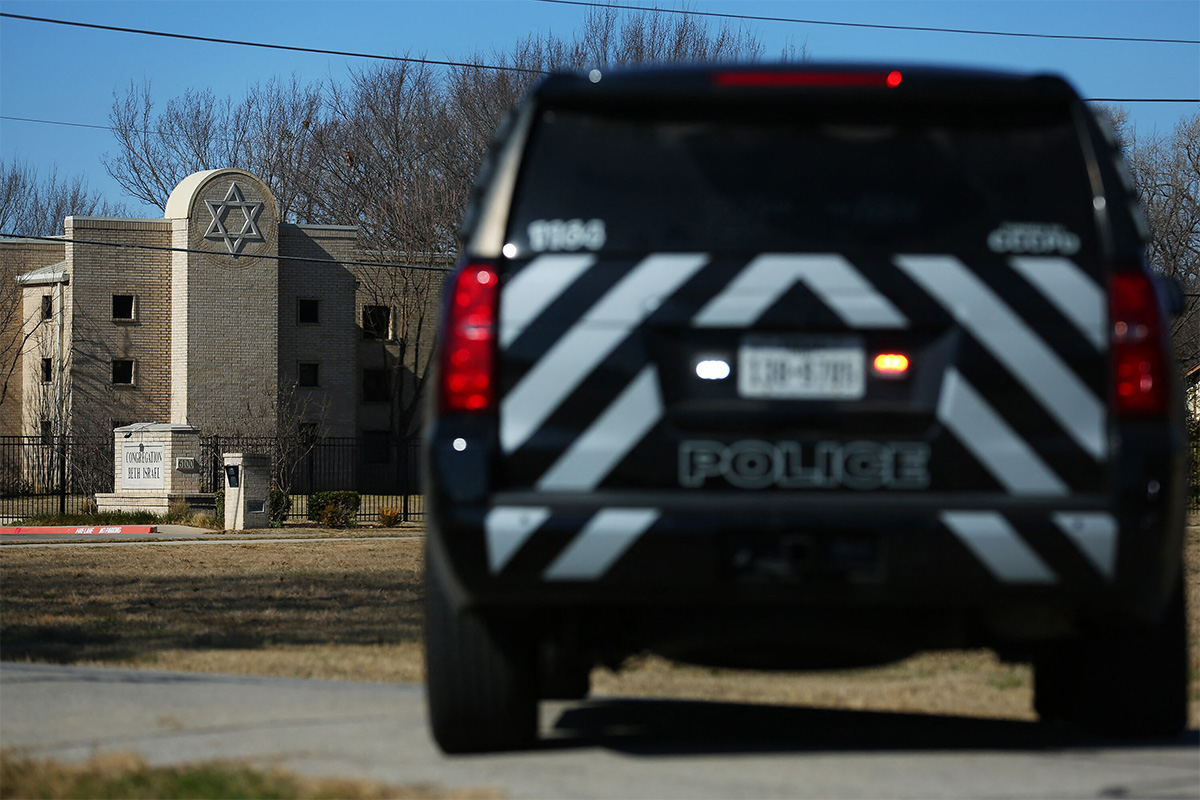After services, my wife said to me, “I know it’s Shabbat, but I think you should know what is happening.” I froze. “There’s a hostage situation at a synagogue in Texas,” she said, and I blanched. It was happening, again.
No one in my shul had said anything about it — we didn’t know. We were on Zoom because of the omicron spike, feeling once again like March 2020. We prayed and sang with our mics muted, except for when we reached the Shema, an unmuted glorious cacophony, a blast of our many voices overlapping, “She-ma yisrael, adonai eloheinu, adonai echad.”
My mind immediately went to the Martin Luther King Jr. Day weekend of 2018, when my soon-to-be-wife and I attended a Friday night service at a Reform synagogue. There were police officers guarding the entrances, a cluster of squad cars in the parking lot and even a helicopter circling the building. For a moment, she was afraid. “Is something wrong?” I shrugged it off. It turned out that the governor, several congresspeople and faith leaders from all over the city were in attendance, so security was ramped up for the service. Unlike the church services my soon-to-be-wife had attended, where police presence was unusual and cause for alarm, security in Jewish spaces is pretty typical.
Our fear is pretty typical.
I have grown up in Jewish American communities hyper-aware of the potential for white-supremacist, antisemitic violence. The metal detectors and security guards at the entrance of the Federation building. The guards who search everyone’s purses and tallis bags on the High Holidays. The escape routes posted in the bathrooms. Safety is one of American Jews’ most central values.
There are the active shooter drills that have preschoolers make their small bodies even smaller, and so quiet, so that the pretend bad guy can’t get them. My mom taught pre-K for almost 20 years at a Conservative synagogue in Los Angeles. “I often thought about whether I could really do it, shield them with my body,” she said. “It was especially hard after the JCC shootings.” She was referring to August 1999, when a neo-Nazi approached the North Valley Jewish Community Center with an uzi and opened fire while the kids were playing outside, wounding two adults and three children. He also murdered a Filipino-American postman during his escape. He had a list of three other Los Angeles Jewish community sites, but was deterred by security systems.
And then, of course, there is the biggest root of this all: the Holocaust, an intergenerational trauma that fuels the fear of antisemitic violence and urges American Jews not to feel too complacent, too much a part of America. At my Jewish summer camp, the counselors asked us to debate whether we were American Jews or Jewish Americans. The threat of violence makes us feel other, Jews in a place that could turn suddenly, like Europe did.
At times, the Jewish community turns this fear in on itself, policing the boundaries of community in the name of safety by deciding who belongs and who does not. Nylah Burton has written here on Alma about the threat of security and police guarding the synagogue doors. According to the Jews of Color Initiative, 80% of Jews of Color have experienced racism in Jewish spaces, including racist, intrusive questions white congregants ask them in order to prove their Jewish credentials in a way that white Jews new to the community do not have to endure. Instead of welcoming everybody in, locked doors, security guards and police officers make Jews of Color vulnerable to exclusion and police brutality.
How can we all feel safe?
With the events in Texas adding to the dismal tally of the shootings at Poway and Pittsburgh, the swastikas found on school property and the dog whistle political attacks from the depths of the internet to the highest offices of government, it’s clear that something needs to change. I grieve the loss of a dream of safety in America. Congregation Beth Israel in Colleyville could have just as well been my synagogue, or yours.
After the events in Texas, President Biden stated, “But let me be clear to anyone who intends to spread hate — we will stand against antisemitism and against the rise of extremism in this country.” This was a welcome statement, especially in juxtaposition to comments from the FBI, who audaciously claimed the motive of the hostage-taker “was not specifically related to the Jewish community.” Our safety is bound to accurate reporting and an awareness of how violence against Jews makes the Jewish community feel.
Let’s be clear: This is antisemitism. The hostage-taker purposely chose a synagogue. Not a military base, a church or a supermarket. He picked a synagogue. He internalized that old trope that Jews control the world, and believed that targeting Jews would achieve his aim of freeing his so-called sister detained nearby. Jews and allies need to actively dispel the stereotype of Jews’ outsized power wherever it is found. We know the danger of leaving such lies unchecked.
If there’s comfort for me right now, it is in community, online, on Zoom, in the interactions of neighbors from Muslim, Buddhist and other faith traditions. I am grateful that the hostages have been freed (though not that the hostage taker has not received a trial, but instead was shot and killed by police). I pray that we are all released from the confinements of fear and narrow-thinking, that we may build a loving, peaceful world where none shall be terrified.



